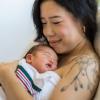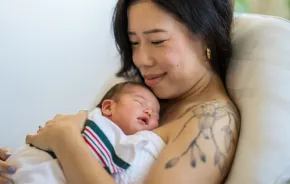 Whether a baby should sleep in the same bed as a parent -- known as co-sleeping or bed sharing -- is a very controversial topic. Inconsistent research findings have led to confusion, and representatives on each side of the argument are convinced their position is correct. This Decision Digest will summarize the conflicting opinions and provide expectant and new parents with information to help them make this deeply personal decision.
Whether a baby should sleep in the same bed as a parent -- known as co-sleeping or bed sharing -- is a very controversial topic. Inconsistent research findings have led to confusion, and representatives on each side of the argument are convinced their position is correct. This Decision Digest will summarize the conflicting opinions and provide expectant and new parents with information to help them make this deeply personal decision.
Why not bed share?
The American Academy of Pediatrics (AAP) recommends that babies always sleep in their own crib or bassinet, in the same room as the parents, to reduce the risk of Sudden Infant Death Syndrome (SIDS). Their official policy statement says, "Although bed-sharing rates are increasing in the United States for a number of reasons, including facilitation of breastfeeding, the task force concludes that the evidence is growing that bed sharing, as practiced in the United States and other Western countries, is more hazardous than the infant sleeping on a separate sleep surface and, therefore, recommends that infants not bed share during sleep. Infants may be brought into bed for nursing or comforting but should be returned to their own crib or bassinet when the parent is ready to return to sleep."
A study done by the European Concerted Action on SIDS found that if the mother smoked, there were significant risks associated with bed sharing, especially during the first weeks of life. Among mothers who didn't smoke, the risks from bed sharing were small, but were still significant during the first eight weeks. On the basis of their study results, the authors recommended that the best place for an infant to sleep is in a crib in the parents' room.
Investigators in Scotland found that while only 8 percent of all families routinely reported bed sharing with their baby, 34 percent of SIDS victims' families reported bed sharing. Their findings led them to endorse the advice from the United Kingdom Department of Health that the safest place for an baby to sleep during the first six months is in a crib in the parents' room.
Brian D. Johnston, M.D., chief of pediatrics at Harborview Medical Center, agrees with the AAP guidelines, saying, "Right now the best evidence is that bed sharing may be associated with a small increase in the risk of SIDS, especially among the youngest infants. I recommend that parents have their infants sleep in the same room, in a bassinet or crib near the parents' bed. This makes breastfeeding easier and may even reduce the risk of SIDS when compared to having the baby sleep in a different room."
Why bed share?
Attachment Parenting International (API) urges parents to use their best judgment when deciding where their baby should sleep. API feels the AAP's recommendation against co-sleeping doesn't accurately reflect the available research regarding co-sleeping and SIDS, is unnecessarily cautious in regard to the potential risks of co-sleeping, and doesn't acknowledge the importance of breastfeeding and shared sleeping for infants' cognitive and emotional development. API points to research showing bed sharing may actually reduce infants' risk of SIDS due to lighter sleep and synchronized parent-infant sleeping patterns, and says safe co-sleeping helps mothers get more rest, improves the breastfeeding relationship and enhances mother-child attachment.
International Lactation Consultant Association (ILCA) notes that "the breastfed infant is more likely to sleep supine and suckle frequently through the night, naturally achieving the potentially SIDS-reducing goals of less deep sleep and frequent brief arousals. The potential effects of the [AAP] guidelines on breastfeeding duration and exclusivity have yet to be explored."
La Leche League International encourages safe bed sharing and has expressed concern that the AAP recommendation against co-sleeping might interfere with a mother's efforts to breastfeed, which has been shown to reduce the risk the SIDS.
The U.S. Breastfeeding Committee says that the AAP's recommendations against bed sharing are "problematic in a number of ways, including that they lack a clear scientific basis, constrain parental choice, complicate the potentially challenging process of putting infants to sleep and impair breastfeeding." Many factors that have associated bed sharing with an increased risk of SIDS are avoidable, they say, including sleeping on unsafe furniture such as couches, and parental smoking or incapacitation due to alcohol, drug use or exhaustion.
Several studies have indicated bed sharing may have potential emotional and psychological benefits for children, including increased happiness and self-esteem and decreased fear and anxiety.
8 Safe-sleep guidelines for either case:
1. Sleep in the same room as your baby.
2. Always put your baby on his or her back to sleep.
3. Be sure your baby sleeps on a firm surface.
4. Keep pillows, bedding, stuffed toys and other soft objects out of your baby's sleeping area.
5. Dress your baby lightly for sleep and keep the bedroom temperature comfortable for a lightly dressed adult so that he or she does not get overheated.
6. Don't let your baby sleep on a couch or anywhere entrapment might occur.
7. Don't sleep with your baby if you smoke, abuse drugs or alcohol, or are exhausted.
8. Don't allow your baby to sleep with other children.
Laurie Thompson is a freelance writer and mother of two living in Bellevue.
Co-Sleeping Online Resources:
- American Academy of Pediatrics, "Policy Statement from the Task Force on Sudden Infant Death Syndrome"
- AskDrSears.com, "Sleep Safety"
- Attachment Parenting International, "Position Paper regarding the new recommendations by the American Academy of Pediatrics"
- British Medical Journal, "Case-control study of sudden infant death syndrome in Scotland, 1992-5"
- International Lactation Consultant Association, "ILCA Responds to Policy Statement by AAP Task Force on SIDS"
- La Leche League International, "LLLI Responds to AAP Policy Statement on Sudden Infant Death Syndrome"
- Mother-Baby Behavioral Sleep Laboratory, "Frequently Asked Questions"
- Pediatric Respiratory Reviews, "Why babies should never sleep alone: A review of the co-sleeping controversy in relation to SIDS, bedsharing and breast feeding"
- United States Breastfeeding Committee, "Mixed Credibility of the Revised AAP SIDS Prevention Recommendations"
- National Institutes of Health, "Safe Sleep for Your Baby: Ten Ways to Reduce the Risk of Sudden Infant Death Syndrome "









